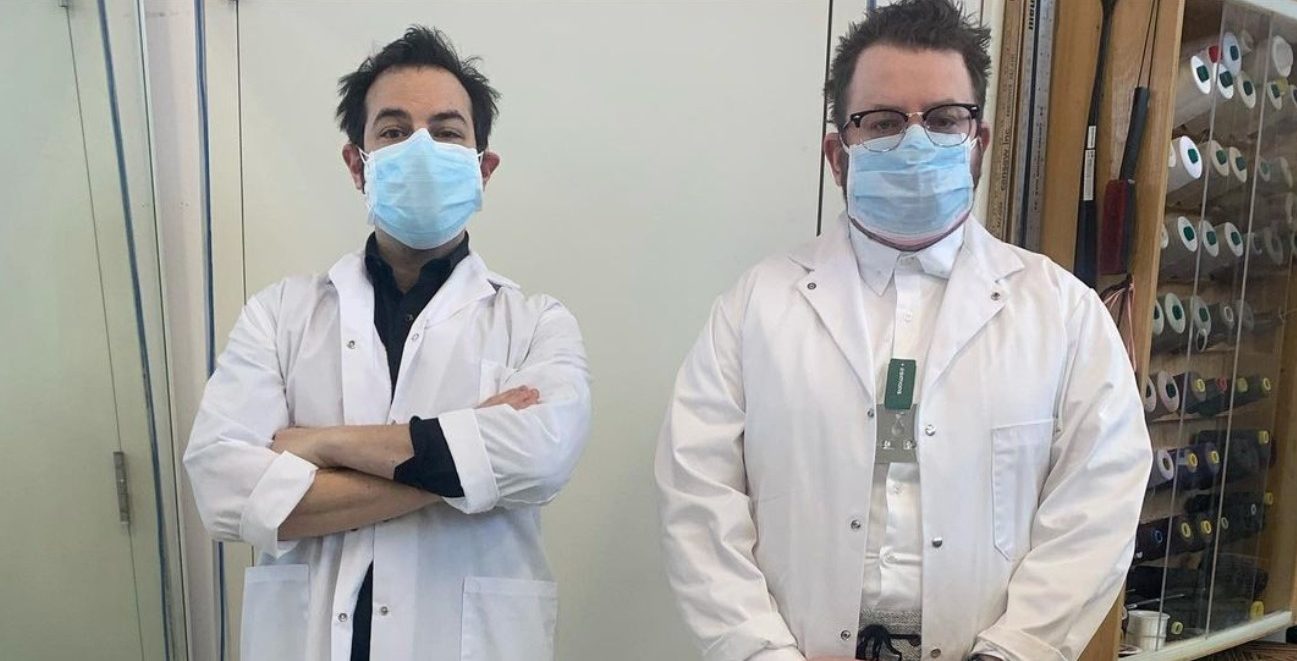Last summer when the comedy duo YidLife Crisis conceived Pandemish they hoped its premiere in the new year would be a joyous victory lap as the world saw COVID’s finish line.
In September, Montreal’s Segal Centre for Performing Arts likewise bravely wagered that it could banish the darkness that had enveloped its stage since March 2020 and, with restrictions eased, launched its first subscription theatre season since the pandemic began after having had to cancel 2020-21.
Pandemish, the third show in the season’s lineup, will run as scheduled this month, but online because performance venues in Quebec have been closed since Dec. 20 due to the Omicron surge.
Originally slated for in-person attendance from Jan. 22-30, with a virtual option for some performances, Pandemish is now being made into a film that will be available for viewing from Jan. 27-31.
That things are not yet “pandemish” but rather in full pandemic mode, has not discouraged the new show’s creators and stars Eli Batalion and Jamie Elman, who are making their Segal subscription season debut as a duo. Elman is something of a veteran, having headlined the hit play Bad Jews.
“We’ve had to use that P-word—pivot,” said Batalion. “We had planned for a feel-good lampooning of COVID, a triumphant celebration, but then it raised its ugly head again.”
The Segal had planned all along for a virtual option, likely a livestream, realizing that many patrons are away in January, or just don’t want to leave the house.
Virtual audiences are nothing new for Batalion and Elman. Their 2014 breakout was a web series of short skits in which they played odd couple friends, who irreverently dissect the state of Judaism today—entirely in the Yiddish they learned at Bialik High School.
That original series, subtitled in English, has had over four million views. YidLife Crisis productions have received four Canadian Screen Award nominations.
Recorded on the Segal’s main stage, Pandemish will be a fast-paced variety show (in English), a mixture of standup comedy, video content, and music that Elman and Batalion provide themselves on piano and guitar.
“This will be as close as you can get to live theatre performance without being there,” Elman said. To keep it relevant, they are tweaking Pandemish right up to the last minute, rehearsing at the Segal with a skeleton crew and under strict health protocols.
“Eli and I can barely be in the same room,” said Elman, who has lived in Los Angeles for more than 20 years and sees nothing funny in returning to Montreal in winter.
Finding humour in a pandemic requires sensitivity but the pair will not shrink from their trademark brashness. “As they say, comedy is tragedy plus time,” said Elman. After almost two years, the lapse is sufficient, they believe.
“Jews have survived through comedy,” adds Batalion. “The situation is so absurd that all we can do now is laugh.
“Instead of a celebration of a return to normalcy, this will be a celebration of having made it this far, of still being alive, and of showing we can still laugh… Just know that we’re going to make it worth your while, because if we don’t we know that we will never hear the end of it.”
The pandemic has, of course, brought their live performances to a standstill elsewhere. The first in-person show they did in more than a year and a half was in Frankfurt, Germany at a Jewish cultural festival this fall during that brief bright spot when the pandemic was waning.
“It was one of the best-received shows we’ve ever had,” said Batalion, “riffing on the relationship between German and Yiddish, and the more complex relationship between Germans and Jews.”
With no indication from the government when the current closure will end, the rest of the Segal season is in question. Quebec allowed full capacity in theatres in early October, and the first two plays, the one-man Every Brilliant Thing and SuperDogs: The Musical, which closed Dec. 19 just before the reinstated shutdown, enjoyed successful runs.
Black and Blue Matters, a new musical co-production with the Black Theatre Workshop, is scheduled to open in February, followed by the English premiere of the Israeli play One Night in April. The Segal had also tentatively chalked in the Dora Wasserman Yiddish Theatre’s remount of the classic The Sage of Chelm for later in the spring.
“Unfortunately, right now we are in limbo,” said Mélanie Thompson, head of communications. “Rehearsals and workshops for both of the last two productions are still (taking place) virtually and in-person when necessary with all safety guidelines in place while we wait for updates. Our other in-person programming is also on hold.”
